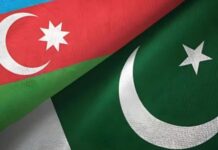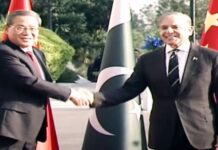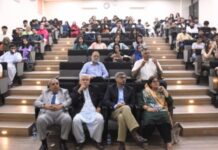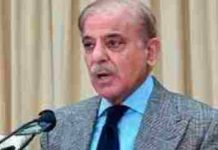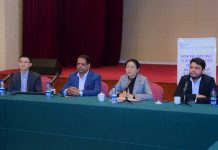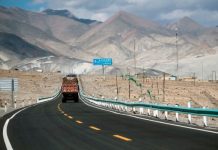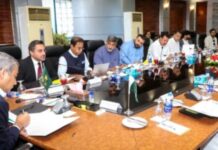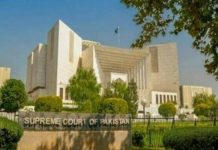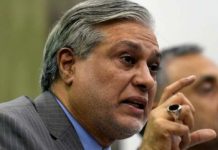ISLAMABAD, Jun 07 (NNI): Minister for Planning, Development and Special Initiatives Professor Ahsan Iqbal on Wednesday said Pakistan was in dire need of a ‘decade of political stability’ to turnaround the national economy and achieve the consistent growth trajectory.
“There is a big opportunity for us to streamline the internal system, ensure political stability in the country and create a decade of stability as economic policies do prove result-oriented before ten years,” he said while addressing an international conference here.
The conference titled “Developments in the Middle East: Lessons and Opportunities for Pakistan” was organized by the Islamabad Policy Research Institute (IPRI).
During 2013-18, the minister recalled that the Pakistan Muslim League-Nawaz (PML-N) government had effectively tackled the confronted issues of load-shedding, terrorism, security and economy besides bringing around $ 29 billion investment under the China-Pakistan Economic Corridor (CPEC) projects.
“But unfortunately the development-journey was punctured in 2018 general elections in the shape of artificial change,” he added.
Seeing the unprecedented national development during the PML-N last tenure, Ahsan Iqbal said the Price waterhouse Coopers (PwC), an international ranking company, had predicted that Pakistan would be standing among the top 20 economies of the world by 2030.
He was of the view that all stakeholders, remaining within their domains, should think how they could align themselves with the common vision of Pakistan to move forward towards the development and prosperity, adopting the ‘collaborative and harmonized mode.’
The minister said there was a great scope for Pakistani to increase cooperation with Middle Eastern countries and get investment, technologies and expertise in diverse fields like agriculture, livestock, information technology, human resource development and mining, which would be beneficial for increasing the country exports.
He said the region was witnessing a fast-pace development projects for which the skilled manpower needed, and accordingly the incumbent government had recently established a Task Force to align Pakistan’s workforce and youth with the market-based demands.
According to an estimate, the minister said the trade volume between GCC (Gulf Cooperation Council) and Asian countries would exceed the figure of $600 billion by 2030.
He said Pakistan had strategic partnership with Middle Eastern countries, China, European Union, United States of America and GCC states, adding Pakistanis living in different parts of the world were significantly contributing to the national economy by sending home valuable remittances.
Commenting on Pakistan’s strategy to achieve sustainable development, the minister informed the conference participants that the Planning Minister had launched the ‘5Es Framework’ to turnaround Pakistan after the National Economic Council (NEC) approval on Tuesday.
Shedding light on each component of the strategy, he said the 5Es Framework was centered around five key pillars.
The first E, he said, was aimed at increasing exports as the country’s future heavily depended upon how fast it become export-led economy. “Our poor performance in exports is the principle reason for our current crisis. We need an export emergency. This E in particular focuses on initiatives that will tackle the chronic boom-and-bust cycles and stabilize the economy.”
Ahsan Iqbal said the second E was about E-Pakistan which would ultimately help Pakistan “Building a Knowledge Economy” with a mission to harness the immense potential of IT and Telecom exports. “This pillar aims to lay the foundation for a robust knowledge-based economy in Pakistan. Accelerating the digitization ecosystem and expanding the IT sector are key objectives to foster socio-economic growth.”
The minister said that the third E was about Environment & Climate Change which focused on water & food security.
“This E prioritizes institutional, legal, and policy objectives for mitigating its impact. Addressing water and food security challenges is a key focus area, ensuring the sustainability and resilience of the nation.”
Explaining the forth E that related to Energy & Infrastructure, he said the government wanted secure, sustainable and affordable energy for all including the industry and other development sectors.
Talking about the 5th E which was about Equity & Empowerment, Ahsan Iqbal said its primary focus was to “Leave No One Behind,” empowering youth, women, persons with disabilities, and the least-developed regions of the country.
“The launch of 5Es marks a significant milestone in Pakistan’s journey towards sustainable economic growth and development. The 5Es Framework sets the stage for transformative change, addressing key challenges and capitalizing on opportunities for the betterment of the nation and its citizens,” the minister remarked.
The minister said the government had also presented “Pakistan Outlook-2035” before the NEC, apprising it if the country continued with the same approach of ‘business-as-usual’, it would become $570 billion economy by 2035. But, if the country chose the ‘transformational and aspirational’ path with 6-8 per cent, it could become $1trillion economy by doubling the volume, he said, adding “So choice is ours whether we want to become $1 trillion economy or $570 billion economy.”
He said if things went on usual, the poverty would increase 40 per cent and if transformational path was followed, the poverty would fall by 15 per cent. NNI






